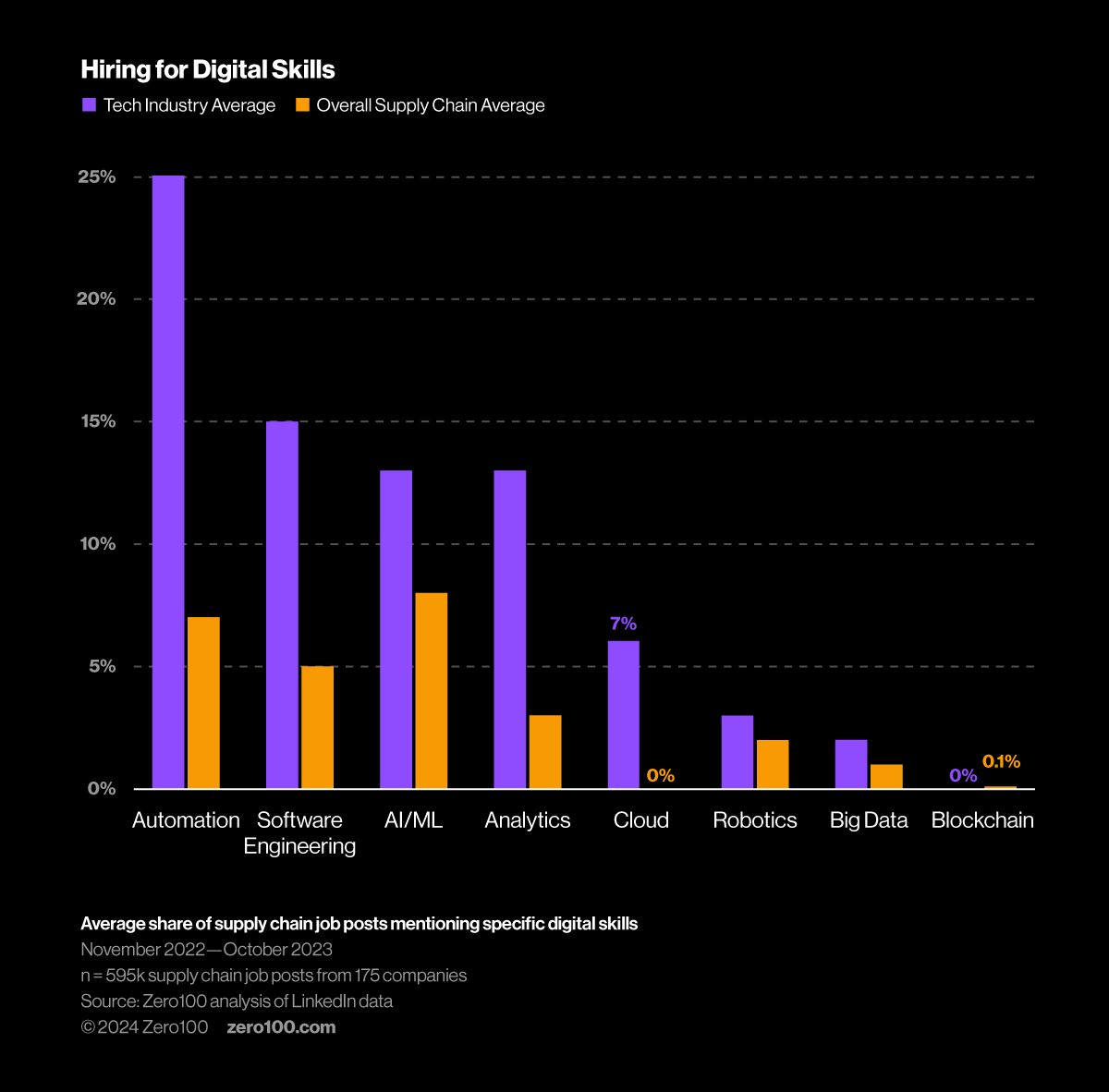

How Tech Companies Are Recruiting for Digital Skills in Supply Chain
Given the nature of the industry, it may not come as a surprise that tech companies are seeking out, hiring, and retaining digital talent more than other industries. But how far ahead are they... and how exactly are they doing it?
Key Takeaways
-
1
Tech companies require digital skills in almost half of supply chain job posts (49%), the most of any industry, followed by pharma, which require these skills in 27% of supply chain roles.
-
2
Within supply chain roles at tech companies, AI/ML is required 4.5x more than the supply chain average (across all industries), automation is required 3.5x more, and software engineering is required nearly 3x more.
Given the nature of the industry, it doesn’t come as a surprise that tech companies are seeking out digital skills significantly more than other industries in supply chain-specific functions. Within supply chain job posts from 17 tech companies, nearly half of tech role descriptions require at least one digital skill (49%), compared to only about a quarter of roles from all other industries, with the second most mentions coming from pharma, closely followed by auto and energy. B2B tech manufacturers are top recruiters for digitally savvy talent, led by Texas Instruments, where 82% of supply chain job posts list digital skills, followed by Emerson (76%). Consumer-facing brands Dell, Microsoft, and Alphabet ask for technical skills in well over 50% of supply chain roles. Only two of the 17 tech companies Zero100 tracks mention digital skills less than the average, which is 21%, in supply chain roles.
A deep dive into the specific skill sets that stand out as the most in-demand within the tech industry compared to the overall average among supply chain roles provides a more insightful view of priority areas. A few standouts in the tech industry include AI/ML, required in 13% of supply chain job posts (more than 4.5x the supply chain average), automation, required in 25% of job posts (nearly 3.5x more than the supply chain average), and software engineering at 15% (nearly 3x the average). Despite leading on recruiting for digital skills overall on an industry-by-industry basis, tech companies are behind on recruiting for specific key skills, namely blockchain (where industrials, shipping & logistics, and apparel & footwear lead), robotics (auto and industrials lead), and big data (shipping & logistics, pharma, and food & drug retail lead).
Zeroing in on the specifics of this recruitment, Google, known for its skilled workforce and its high retention – it is, in fact, in the top 10% of companies when it comes to retaining quality employees – has come to be known for its unusual hiring techniques. One of the most infamous is their (now defunct) practice of stumping interview candidates with tough brainteaser questions such as, “Define a service that would allow you to travel to the future,” and “If you wanted to bring your dog to work but one of your team members was allergic to dogs, what would you do?”
While questions may have revealed how a potential candidate responds under pressure, the Google hiring team ultimately ditched the practice, instead opting for “structured interviewing” which, to control variability and better predict success, standardizes interview questions and scores them all the same way. Along with culture-fit-related questions, technical role interviewees (for example, for a software engineer position) can expect job-related, technical questions around coding and system design, specifically graphs and trees, arrays and strings, dynamic programming recursion, geometry, and math.

Amazon, which like Google has a high retention score (in the top 30%), recruits for highly technical, supply chain-specific roles by requiring a mix of broad technical skills, such as “statistical modeling, machine learning algorithms, and data visualization techniques” as well as specific program knowledge/expertise, such as “programming languages such as python, r, or sql for data manipulation and analysis, bi tools like aws quicksight.”
To build out well-rounded teams with the right digital skills, consider the hiring strategies of leading tech companies like Amazon, Dell, Microsoft, and Alphabet. Their model suggests you should treat your supply chain job postings as an SEO exercise, clearly specifying technical keywords around skills, programs, and experience (but don’t forget about soft skills). Put together teams with complementary but differing skills, allowing them to upskill each other, and you will have laid the foundation for the successful execution of your most pressing digital initiatives.
To see a different data cut or to dig deeper into this topic, reach out to our Head of Research Analytics, Cody Stack, at Cody.Stack@zero100.com.
Methodology
Zero100’s proprietary data and analytics are a combined effort between our data scientists and research analysts. We provide data-first insights matched with our own research-backed points of view and bring this analysis to life via real-world case examples being led by supply chain practitioners today.
For this study, we looked at 595k supply chain LinkedIn job posts from 175 B2B and B2C companies. Our analysis categorizes listings based on mentions of specific digital skills within job titles and descriptions.